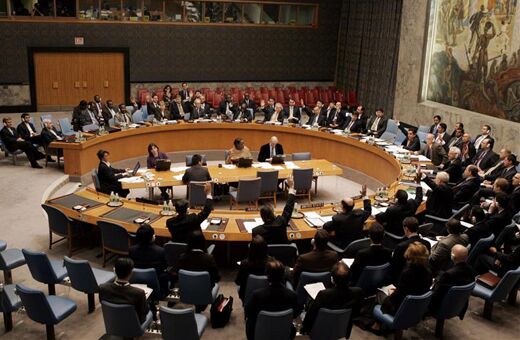
Iran Defiant in Face of UN Sanctions
The Iranian defense minister has dismissed United Nations sanctions on Iran as being worthless and said they will have no impact on the nation. The Iranian president referred to the resolution as a “scrap of paper.” Is this talk by Iranian officials just bravado, or does it reflect the inability of the United States to take meaningful action against Iran?
UN Security Council Resolution 1737, designed to punish Iran for refusing to cease uranium enrichment, was passed unanimously on Saturday after months of debate and delay. Though praised as a demonstration of the agreement within the Security Council to isolate Iran, in reality it represents a compromise so great as to be largely ineffective.
The resolution demands Tehran “suspend all enrichment-related and reprocessing activities, including research and development, and work on all heavy water-related projects.” To give weight to the demand, the resolution calls on the international community to cease supplying Iran with material and technology related to its nuclear and ballistic missile programs. If Iran still doesn’t cease uranium enrichment, the penalty would be further sanctions. (With the current resolution only being agreed after months of bickering and backing down, the chances of further sanctions being agreed seem rather remote.)
“This resolution is a strong signal to the government of Iran that it should accept its international obligations, suspend its sensitive nuclear activities and accept the negotiations path,” stated U.S. Secretary of State Condoleezza Rice. Apparently, Tehran didn’t pick up the signal.
Iran immediately rejected the resolution, with President Mahmoud Ahmadinejad declaring that the world would just have to accept Iran as a nuclear state. Far from appearing to have any punitive effect, the resolution prompted Iran to vow to drastically speed up its nuclear program. On Sunday, Iran’s chief nuclear negotiator, Ali Larijani, said work would commence immediately to install a further 3,000 uranium enriching centrifuges. The Iranian parliament is also threatening to limit UN inspections. Judging by Iran’s track record, it is not unreasonable to assume that Tehran will follow through.
Aside from the issue of how and whether the resolution will be implemented by various countries, Iranian allies Russia and China ensured the resolution was so watered down that it wouldn’t hurt their interests—nor, to any great extent, Iran’s. “The resolution fully reflects economic interests of Russia and other partners of Iran,” Russian Foreign Minister Sergey Lavrov said, hailing it as a reasonable compromise. Russia gained exemption for any sanctions relating to the Bushehr nuclear power plant, which it is building for Iran. A ban on international travel for Iranian officials involved with nuclear and missile development was also dropped in order to get China and Russia on board.
Some in Israel warn that the resolution is clearly inadequate. Former Israeli ambassador to the UN Dore Gold pointed out that a whole decade of sanctions on Saddam Hussein’s Iraq weren’t successful. On December 23, the Jerusalem Post reported:
The decision by the UN Security Council on Saturday to impose sanctions on Iran was met with caution within the [Israeli] defense establishment. There was certainly no excitement in the corridors.
Israel has been pushing for sanctions for years and while they have finally been imposed, they are believed to be too little and too late. According to forecasts within the defense community, the sanctions … will not stop the Islamic Republic from continuing with its pursuit for nuclear power. … [D]oes the Security Council’s action constitute a sufficient deterrent? Hardly, runs the security establishment’s consensus.
Far from demonstrating a united international community determined to punish Iran and prevent it from obtaining nuclear weapons, the agreement on UN sanctions is a “demonstration of Western weakness,” according to the Washington Post. The Post claims Russia hijacked the Security Council’s deliberations and succeeded in stripping the sanctions of any teeth:
The Bush administration, which has been relying almost entirely on multilateral diplomacy to prevent a nuclear Iran, originally proposed a set of modest sanctions …. The idea was to escalate to tougher measures if Iran did not respond.
Instead, the administration has spent nearly four months seeking Russian consent for the initial measure, yielding again and again to Moscow’s intransigence. First, a large nuclear reactor being built for Iran by Russia was exempted from a proposed ban on nuclear imports, even though Tehran could someday use the facility to acquire plutonium for weapons. Next, European governments sponsoring the resolution were forced to drop the proposed travel ban—the only measure left that might have caused the mullahs some pain.
Russia’s ability to hold the Security Council hostage, says the Post, means “that any UN resolution against Iran will be a pyrrhic victory for the United States. The message to Tehran is not that it faces isolation or economic ruin if it fails to respect the Security Council’s order; it is that it need not fear sanctions.”
While the sanctions may cause Iran some little hindrance, they clearly will not deter it from pursuing its goals. In reality, the main purpose the sanctions serve is to provide the U.S. with an alternative to any real meaningful action. The fact that America is covertly working with Iran to alleviate problems in Iraq denies the U.S. other, more robust, options. And Iran knows it. As Ahmadinejad taunted, “Give up this muppet show. You cannot send secret friendly messages to us and at the same time show your teeth and claws.”
With UN sanctions being the toughest option the U.S. seems willing to contemplate toward Iran, perhaps the bravado is more on the side of America than Iran.
